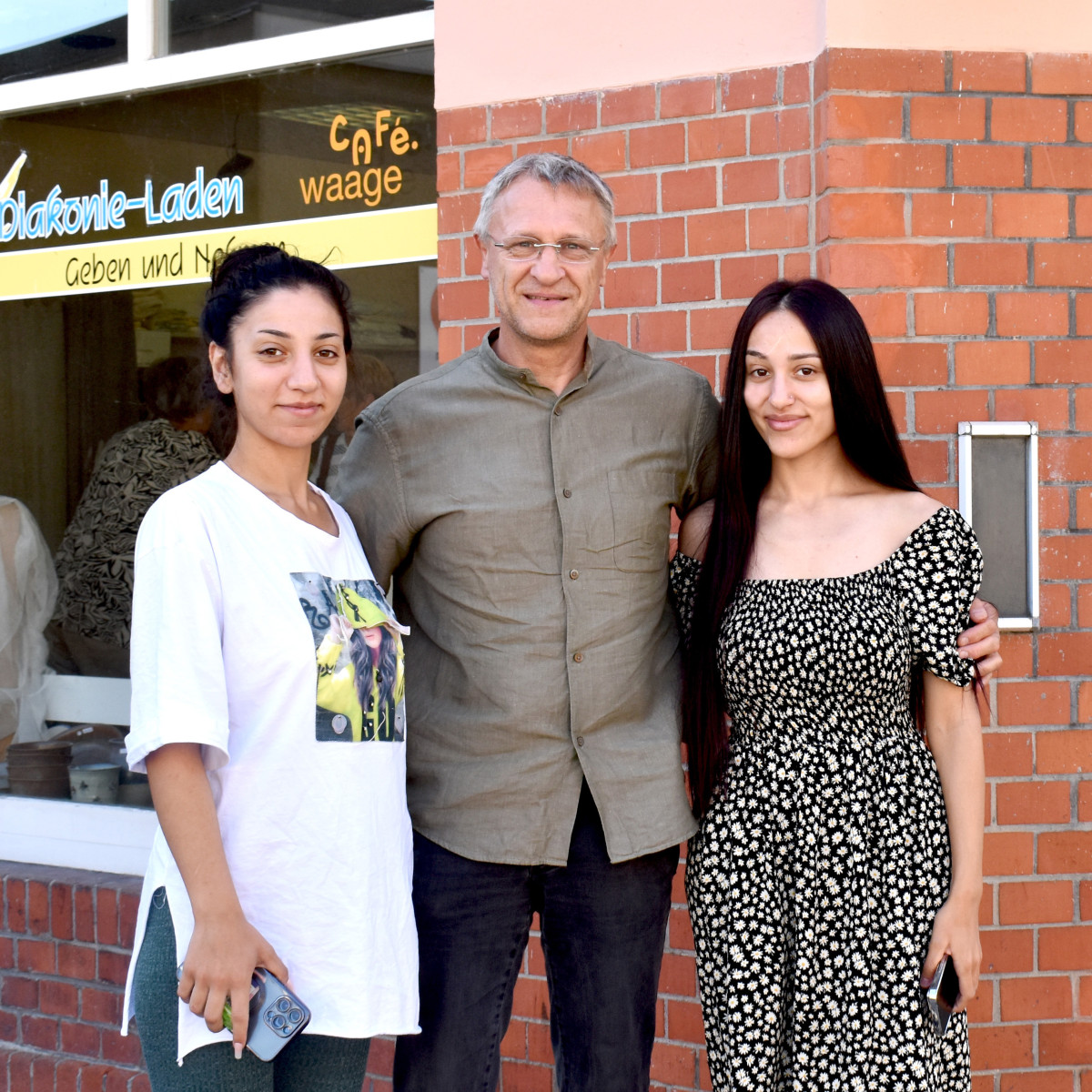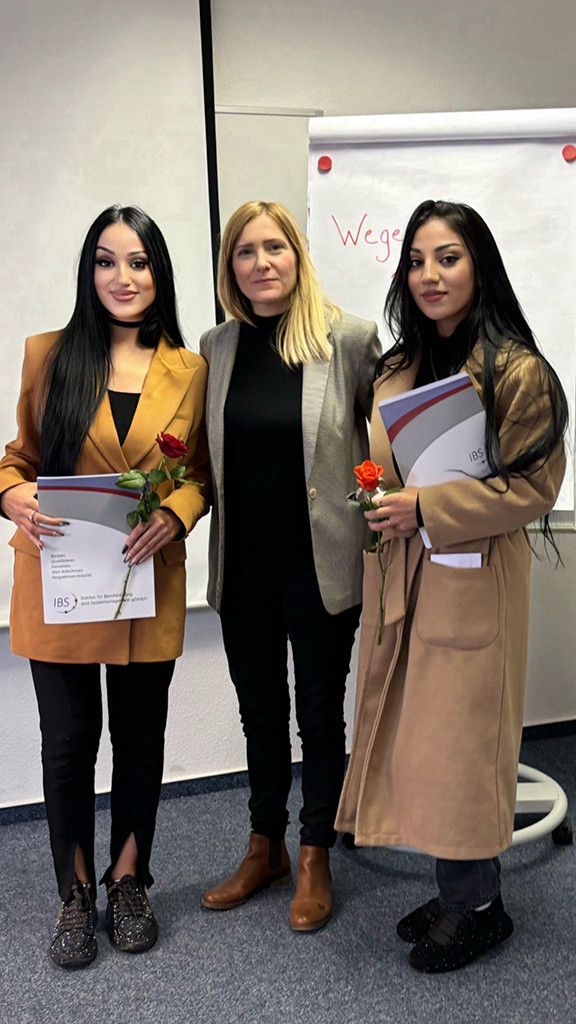Siljana und Migena Bastri
Thank God our wish to live in Germany and continue our training as nurses has been fulfilled.
20 und 24, Bad Lobenstein
Interview with Migena and Siljana Bastri
Into the nursing profession through good LAT networking
Migena (24) and Siljana (20) Bastri have been living in Germany for almost two years now. When the Albanian sisters moved to Wurzbach in the Saale-Orla district with their parents at the end of 2022, they were aware that it would be difficult to obtain a residence permit in Germany. Albania is one of the so-called safe countries of origin, so the chances of obtaining asylum were not very good.
The two sisters sought support for their integration journey and found out about the LAT project Jobmanager Saale-Orla-Kreis through their parents' cousins. Migena and Siljana Bastri only had difficulties with the language at the beginning. The family had already arrived in Germany in 2016. Initially, the sisters were able to attend 6th and 7th grade at a school in Thuringia. However, their asylum application at the time was rejected, so the family had to return to Albania. They no longer spoke any German there, but after their first time back in Germany, they remembered the language well.
"We regularly went to the job managers when we got an appointment. They helped us right from the start with what my parents should do now and what we should do now," says Migena Bastri.
Ralf Thomala, project employee at Jobmanagers SOK, then also introduced the sisters to the LAT project Ways into Care (WiP), a 9-month basic qualification course for care assistants in Erfurt. The subject area was new to the two of them, but above all they were looking for training that would give them the chance to stay in Germany permanently.
First practical experience in care
The WiP project also includes a two-week pre-study work placement so that the participants know in advance whether the nursing profession is for them. Migena and Siljana Bastri completed their internship at the Diakonie day care centre. "The beginning was difficult because there were words I didn't even know," says Siljana, "I've never done a German course here. Apart from that, the work was good, you learn a lot of new things."
Unfortunately, one of the nurses had an experience with a prejudiced colleague. On the other hand, the older patients were very nice and open, which positively surprised the young nurses. Siljana and Migena also enjoyed the longer internship during the WiP course. "We both did it in outpatient care. It's a lot more fun, you can do a lot of different things there."
"The train was like a second home"
The nurses then mastered the Ways into Nursing course with very good results. Their biggest challenge was the journey. "We lived in Wurzbach, which is a two-hour train journey there and two hours back, which was very exhausting and we had to learn a lot," says Siljana Bastri.
"The train was like a second home," laughs Migena Bastri, "we learnt and slept there too."
The other participants on the course became a kind of second family. "We learnt, ate, played and worked together. They were all very kind to us and we even celebrated our birthdays together," recalls Migena Bastri. The two also had positive experiences with the lecturers and social pedagogue Stefan Tinkhauser. "We just really enjoyed it, they always helped us and we could come to them with any problem."
On 1 September, Migena and Siljana Bastri will finally start their training as care assistants. To prepare for their training, they took part in the Fias (Fit in Ausbildung und Schule) course at the IBS. In the course, the participants are prepared for their training over six weeks in German, maths, English, business and social studies. This gives them the best possible foundation.
During their time on the IBS course, Migena and Siljana also received a lot of support from Theresa Frank, a counsellor in the Bleibdran+ project at IBS. "Mrs Frank helped us a lot with all the steps for the hardship commission. We couldn't have done it without her and we are very grateful for that," reports Migena Bastri. The two had to wait a long time for the commission's decision. "After six months, Siljana and I received the positive response that we would be granted a residence permit for two years. Thank God our wish to live in Germany and continue our training as nurses has been fulfilled."
Nevertheless, arriving in Thuringia is not easy for the young women. "There's not much in Wurzbach. Bad Lobenstein is different. But it's difficult in Wurzbach without a car, because buses or trains only run every two hours, so you can't integrate at all," says Migena Bastri.
For their future, Migena and Siljana Bastri naturally hope to successfully complete their training and then they would like to train and work as skilled workers. They do not want to live in Wurzbach in the future and as they both like outpatient care best, they also have a driving licence on their wish list.
They owe their current residence permit in part to their training place, but things are more difficult for their parents as the immigration authorities will not grant them a work permit.

Interview with the LAT project Job Manager Saale-Orla-Kreis (Diakoniestiftung Weimar Bad Lobenstein gGmbH)
High level of commitment and perseverance despite poor prospects
In November 2022, Migena and Siljana Bastri came to the LAT project Jobmanager SOK in Bad Lobenstein together with their parents and a lot of hope in a seemingly hopeless situation. Ralf Thomala, a counsellor at Jobmanager, immediately noticed how committed the two sisters were and that they could speak German very well. Ralf Thomala remembers the first meeting: "The girls brought along a newspaper article from 2016 from the OTZ, which reported on them as positive examples of successful integration with very good language skills. That was very interesting right from the start."
The big problem for Migena and Siljana was that the family had already entered the country for the second time and had applied for asylum. The first asylum application was rejected in 2016 and the family was deported. The family re-entered the country and applied for asylum again. "We were in a very bad position," reports Ralph Thomala. "I then researched everywhere to see if we could find a training place somewhere for Migena and Siljana."
Both of them could well imagine training in the care sector because there is a great demand for carers and therefore also the prospect of training places. Migena and Siljana live with their parents in Wurzbach, a small town near Bad Lobenstein. Transport links in rural areas are often inadequate, and finding an easily accessible training company is not always easy.
Nevertheless, the two sisters were determined to pursue a career in nursing and, with the support of Ralf Thomala, enrolled on the "Pathways into Nursing" (WiP) course at the IBS in Erfurt. For nine months, this meant travelling to Erfurt by train every morning at 06:00 and returning in the evening at 18:00. Migena and Siljana took the hurdle and successfully completed the course.
The effort was worth it
Migena and Siljana had to complete work placements in the care sector before and during the WiP course. Thanks to the LAT project's connection to the social welfare organisation, places were quickly found for both of them in Wurzbach and Bad Lobenstein. Previously, repeated applications for authorisation had to be submitted to the immigration authorities. Numerous discussions with the authorities were also necessary in order to receive approval for training. Ralf Thomala describes the situation at the time: "We were certainly annoying and kept asking. "My colleague Mrs Gersdorf and I said to ourselves, now we've started, we want to finish successfully." The new directive, which also categorised "care assistant" as a system-relevant profession, gave us additional incentive. At some point, we were also given the go-ahead to talk again if there was a prospect of a training place. At the same time, an application was made to the hardship commission. The two sisters also received support from Theresa Frank from the BLEIBdran+ project at the IBS.
Step by step into training
The next step was to find a training place. Once again, mobility was a problem, as the distances to most vocational schools would have been very long. Fortunately, Diakonie has contracts with certain nursing schools for its trainees. These include the medical college in Saalfeld, which is also relatively easy to reach from Wurzbach. Then applications and applications had to be written. For every internship and professional activity, an application must be submitted to the immigration office and a certificate from the employer is required. The nursing home for the training is located in Ebersdorf. As it is very difficult to get to Ebersdorf from Wurzbach when working shifts, we also needed a flat. As Siljana and Migena were still in the asylum process, they had to apply for authorisation from the district administration office for asylum social benefits. A small flat was found in the "Emmaus" retirement home, Siljana's future place of training. The flat was furnished with furniture from a Diakonie donation store. It was of course a great joy for everyone when Migena and Siljana received the positive result from the hardship commission. "The effort they have put in is really impressive." Both continued to volunteer in care facilities in Bad Lobenstein and Wurzbach after their internships in order to gain more experience.
"I think it's a great shame that I will no longer be able to look after them from 31 July, as both of them will then switch to the SGB II legal system due to their residence permit," regrets Ralf Thomala. "Of course, a bond has grown over the years. It's the same with all those seeking advice who change legal status and are then no longer allowed to come to us for counselling. Of course, many don't understand this and still keep knocking on our door."
The long-standing Job Manager counsellor is certain that Migena and Siljana will succeed in their endeavours. "Of course, I would be particularly pleased if they both stayed in the area after their training. Most young people are usually drawn to the cities after all."

Mehr über das Projekt erfahren Weitere Praxisbeispiele ansehen